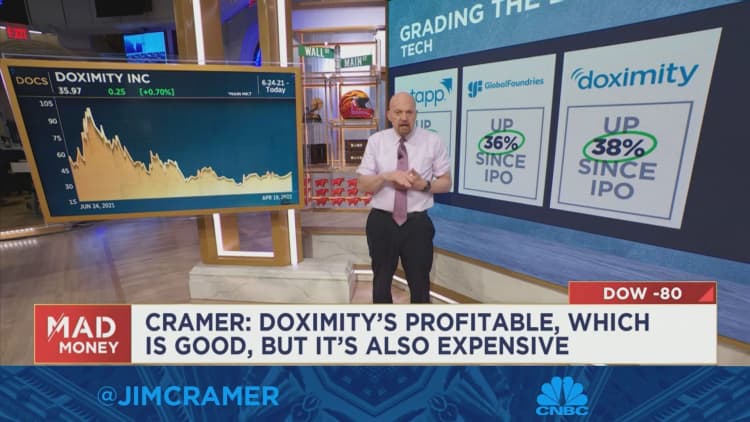Doximity at the New York Stock Exchange for their IPO, June 24, 2021.
Source: NYSE
Doximity, the medical website that’s used by more than 80% of U.S. doctors, is now trying to protect its millions of members after a spike in harassment that started during the Covid pandemic.
The 13-year-old company has introduced a free service called DocDefender that can scrub a physician’s personal contact information from the internet. The technology scans dozens of the most common websites where a doctor’s information might reside and automatically initiates the removal process.
Doximity’s platform, which for years was described as LinkedIn for doctors, allows health-care workers to stay current on medical news, manage paperwork, find referrals and carry out telehealth appointments with patients. Since the Covid pandemic broke out in 2020, health-care workers have faced elevated levels of harassment and violence due largely to the politicization of masking, social distancing and vaccine requirements.
Doximity says the new feature is all about giving peace of mind to doctors so they can feel safer in their personal and professional lives and can focus on providing better care.
Dr. Amit Phull, chief physician experience officer at Doximity, said the feature is a service that users wanted. In March, more than 200 doctors traveled to Doximity’s headquarters in San Francisco to help the company workshop new ideas for its platform. When executives presented DocDefender, they received a resounding standing ovation.
“We’ve gotten positive feedback before,” Phull told CNBC in an interview. “That was a first for us.”
Two months after the workshopping event, Doximity conducted a survey of more than 2,000 doctors and found that 85% of them worry about whether patients will access their personal information online. That number is higher within certain high-stress specialties like physical medicine and rehabilitation, neurology, emergency medicine and psychiatry.
Jeff Tangney, CEO, of Doximity at the New York Stock Exchange for their IPO, June 24, 2021.
Source: NYSE
Phull, who practices as a physician in emergency medicine, said he’s felt concerned about his safety many times throughout his career. He carried out his trauma training in Chicago, where he treated several victims of gang-related violence. Phull said he was often thrust in the middle of complex conflicts that were out of his control, and he worried that people would find him online and retaliate.
“If you find yourself in one of those high-intensity situations, and outside of the scope of your practice that conflict still persists, that online element can be kind of scary,” he said.
Since the onset of the pandemic, many patients have a shorter fuse.
“I’ve been swung at by patients,” he said. “We certainly deal with a lot of hostility.”
Phull said that in testing the technology, he found details like his phone number, his relatives, his past and current addresses — and even a map to his old home on more than 25 websites. Now that he knows that information is being removed, Phull said he and his wife feel a little more comfortable.
DocDefender users can monitor the removal process directly through Doximity’s interface, and they will receive regular follow-up reports about the status of their online presence. Additional scans will also be carried out periodically to identify any new listings.
The service will be available to all doctors on Doximity starting Wednesday, and will expand to nurse practitioners and others over time.
‘Opportunity to think very long term’
In addition to reaching more than 80% of U.S. doctors, Doximity says it’s also used by 50% of nurse practitioners and physician assistants.
The platform verifies members to ensure that they’re practicing health-care professionals. Approved clinicians can use Doximity for free, as the company primarily generates revenue through its hiring, marketing and telehealth solutions.
Doximity debuted on the New York Stock Exchange in June 2021, during the peak of the tech bull market. Its market cap climbed to $9.4 billion in its first day of trading, but has since fallen below $4 billion.
CEO Jeff Tangney, who co-founded Doximity in 2010, told CNBC the company is able to offer DocDefender for free in part because of its strong profit margins.
“We just have the opportunity to think very long term and to invest in things that doctors really want, and that’s what we’re doing here,” he said.
Dr. Azlan Tariq, a physical medicine and rehabilitation doctor and the chief clinical officer at a physiatry organization called Medrina, had early access to DocDefender.
PM&R physicians often deal with patients suffering chronic pain and are responsible for prescribing — and denying — medications like opioids. Around 96% of PM&R doctors reported feeling concerned about their online privacy in Doximity’s May survey.
Tariq said he’s taken steps to try and protect both his online identity and his physical safety, leaving social media sites like Facebook and taking down personal information elsewhere. He tries not to shop near his clinic to avoid disgruntled patients, and he said he’s always paying attention to his environment.
On one occasion, a patient was waiting for Tariq in the parking lot outside of his clinic. While the patient ultimately meant no harm, Tariq said he had to assume the worst.
“You just think about exits. How can I get out of this?” he said. “Can I get back in the car? Can I get the door of the clinic and go behind? Those are just the normal behaviors.”
He added that some of his colleagues seriously consider carrying a gun.
Since testing DocDefender, Tariq said he’s already noticed some of his personal information has been removed online, adding he feels a little more at ease.
Still, DocDefender doesn’t entirely remove the risk of being found. Dr. Jasdeep Gill, a psychiatrist, said there are some databases for Medicare and Medicaid that list doctors’ information, as well as websites that use their specific provider numbers.
“Within the last two weeks, I’ve had two different people call my cell phone and request care, and I don’t know how they found my cellphone number,” said Gill, commenting that DocDefender is a step in the right direction to guard against this. “Trying to figure out how they got that information left me feeling just kind of uncomfortable.”
Gill works with patients, including some who are incarcerated, dealing with schizophrenia, bipolar disorder, depression and substance abuse. He said he started taking the risks more seriously after a patient made threats against him while he was in residency.
Gill said he paid $20 a month for an information-removal service, but that process was “clunky” and “cumbersome.” He called Doximity’s tool a “really easy service to use” and sees it as a way for physicians to maintain the boundary between their professional and private lives.
“Our background history of where we live, who we’re married to, what our cellphone numbers are, are things that are personal and that should be kept separate from the public’s view,” Gill said. “By creating that separation, it allows us to just do our jobs and focus on health care instead of worrying about safety.”
WATCH: Jim Cramer looks at stocks that debuted in 2021

 EU News Digest Latest News & Updates
EU News Digest Latest News & Updates



